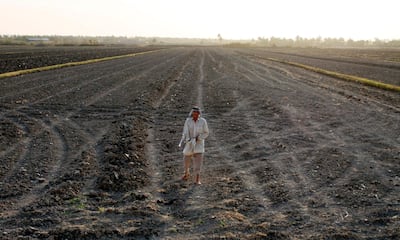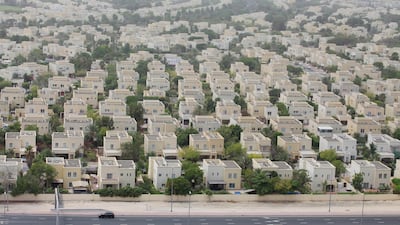UAE residents could face higher household bills fromclimate change, a researcher has warned as he embarks on a project to understand the effects of global warming on the emirate of Abu Dhabi.
Professor Taoufik Ksiksi, of UAE University in Al Ain, has launched a wide-ranging study that will analyse climate change's effects on the economy, including its impacts on consumers and the environment, such as changes in land use.
The project is trying to understand what effects climate change has had to date in order to predict what the longer-term impact could be.
"One of the aspects we're looking at is the use of energy in households. These are aspects we may face from a regional point of view; the use of energy may increase," said Professor Ksiksi, who works in the university biology department.
The project, assisted by Emirati PhD student Latifa Al Balooshi, involves surveying large numbers of residents, farmers and specialists in the emirate.
Among the questions being asked is how household spending has changed over the past quarter of a century.
More than 300 surveys have been collected so far and, although the results have yet to be fully analysed, Dr Ksiksi saidmany respondents had suggested that their bills had increased.
Climate change analysts not involved in the UAEU study agree that Gulf consumers will have to spend more to cool their homes.

"In Abu Dhabi, it's pretty clear, you don't spend any money on winter heating, but a lot of money on air conditioning, and that's going to go up substantially," said Professor Richard Tol, author of the book Climate Economics.
On the other hand, Prof Tol, an economics professor at the University of Sussex in the United Kingdom, said that increases in carbon dioxide could improve agricultural production, albeit for a limited period of time, driving down the price of food imports.
“If there's more carbon dioxide, plants grow faster and plants become more water-efficient, so more drought-tolerant,” he said.
“[According to] the current projections, at least for the first half of this century, that will drive down food prices for imports.”
Acting against this is the possible disruption of food supply chains, which could increase prices, and 80 percent of food in the UAE is imported.
Many climatic effects could impact regional agriculture negatively. There have already been forecastsof more dust storms in the Middle East, longer-lasting droughts and more extreme temperatures. A German research institute has reportedthat summer temperatures in the Mena region will rise twice as. Pressure on water resources will also increase.
Another consumer-related impact of climate change could be a rise in house insurance premiums, especially in coastal areas, said Bob Ward, policy and communications director at the London School of Economics' Grantham Research Institute on Climate Change and the Environment.
______________
Read more:
Extreme weather results in flooding and crashes across Dubai
Think it's hot in the UAE? Spare a thought for muggy Montreal and boiling Belfast
Explained: 10 ways to cut your water consumption
Special report: Abu Dhabi's dwindling water reserves charted in worrying Sorbonne research
______________
Sea-level rises, which are running at about one eighth of an inch per year according to the United States' National Ocean Service, are making coastal properties more vulnerable to flooding.
“Eventually you might find you cannot get insurance because insurers will say it's too high [risk]; it's happening around the world,” said Mr Ward.
The effect could be magnified by a possible increase in the intensity of storms, said Mr Ward, such as Cyclone Mekunu that lashed Salalah, Oman, in May. It was the strongest storm to hit area.
“They might be rare events, but we may find these rare events become more extreme,” he said, adding that sea-level rises combined with stronger storm surges could threaten low-lying areas.
In terms of climate change's economic effects, a study in the journal Nature in 2015 forecast that the global economy would be almost a quarter smaller in 2100 than it would have been without rising temperatures. The effects are likely to be uneven: some colder parts of the world could enjoy an increase in productivity, while already-hot areas, such as the Gulf region, will probably face negative effects.
Mr Ward said a key reason why climate change could affect the global economy is increased migration, which could be forced upon people as their homelands become less habitable.
“If you're having big droughts and floods, you're talking about the potential of … many millions or tens of millions having to migrate. We know from recent and past history that's a recipe for conflict, which is a killer for economic growth,” said Mr Ward.
The UAEU research is also looking at alterations in land use, helped by satellite data. The study has already demonstrated that greening projects have significantly increased the vegetation in Abu Dhabi emirate. Just as some agricultural production could benefit from climate change, Prof Ksiksi said many forested areas could be positively affected as carbon dioxide concentrations increase, with faster plant growth and lower water use.
He acknowledged that the effects of climate change had not yet taken place over a long period of time, making forecasts harder.
“It's a short period for long-term climate change to [have had an effect] … We'll try to use this information from the past to predict what's going to happen in the future,” said Prof Ksiksi.


